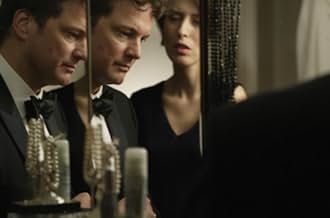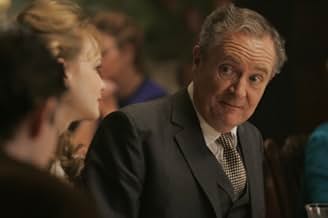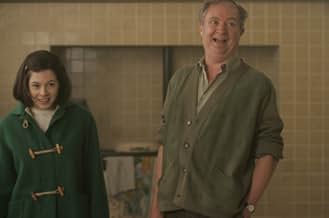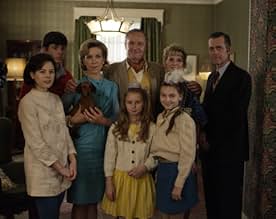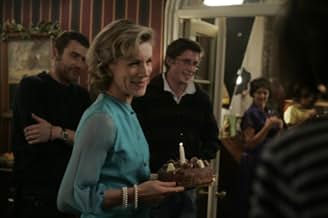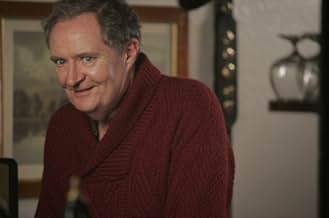And When Did You Last See Your Father?
- 2007
- Tous publics
- 1h 32m
IMDb RATING
6.8/10
4.8K
YOUR RATING
The story of a son's conflicting memories of his dying father.The story of a son's conflicting memories of his dying father.The story of a son's conflicting memories of his dying father.
- Director
- Writers
- Stars
- Awards
- 1 win & 12 nominations total
- Director
- Writers
- All cast & crew
- Production, box office & more at IMDbPro
Featured reviews
At the end of the last conversation I had with my father before he died, he called me a horse's ass. That conversation was the final topper to a very complicated relationship as my father was a man that I feared as a child and pretty much disliked as an adult. Yet, some of the fondest memories I have of my life involve my father and our times together.
I guess all relationships between fathers and sons could best be described as knotty, but the one shown in this film, I must admit, hit very close to home. Perhaps that's why I enjoyed the film as much as I did, and it appears from the comments of viewers and critics that I enjoyed it far more than most viewers.
The basic story, I'm sure, has been repeated countless times throughout history and will be repeated countless times in the future. Blake, a highly successful writer and editor, never received the recognition of "a job well done" from his father. Arthur is a popular physician and raconteur who constantly failed to show his admiration for his son's profession.
Blake realized at an early age that his father had been having a long-term affair with his aunt, and this knowledge colored every part of their relationship. One thing that Blake cannot understand is why his mother stays married to his father for he is sure that she, also, is aware of her husband's relationship with her sister.
The story begins in the present, but most of it is told in flashbacks as Arthur is dying. The adult Blake is played by Colin Firth with just the right amount of distance and depression. He is not a happy man because he never has been able to come to terms with his feelings for his father. Teenaged Blake is played beautifully by Matthew Beard. It is this Blake that we see most of in the film, and his performance is impressive.
Juliet Stevenson is a wonderful actress, and she gives this film a strong, quiet - but not necessarily longtime suffering - performance as Blake's mother. She is one of those women whom you never realize her strength and resourcefulness until push comes to shove.
Jim Broadbent may be a touch over the top as Arthur, but, for me, he hits the nail on the head. We all have public and private faces. Arthur rarely reveals the private one. I found myself liking him in spite of myself.
As I said, this film turned out to be very personal to me. I found myself sometimes being amazed at how much Arthur was like my own father and Blake so much like myself. Even without the personal insight, I think you will find this a rewarding look at the bond between two strong, yet totally different men - OR - the bond between two strong, completely similar men. Fathers and sons - will that connection ever be fully understood?
I guess all relationships between fathers and sons could best be described as knotty, but the one shown in this film, I must admit, hit very close to home. Perhaps that's why I enjoyed the film as much as I did, and it appears from the comments of viewers and critics that I enjoyed it far more than most viewers.
The basic story, I'm sure, has been repeated countless times throughout history and will be repeated countless times in the future. Blake, a highly successful writer and editor, never received the recognition of "a job well done" from his father. Arthur is a popular physician and raconteur who constantly failed to show his admiration for his son's profession.
Blake realized at an early age that his father had been having a long-term affair with his aunt, and this knowledge colored every part of their relationship. One thing that Blake cannot understand is why his mother stays married to his father for he is sure that she, also, is aware of her husband's relationship with her sister.
The story begins in the present, but most of it is told in flashbacks as Arthur is dying. The adult Blake is played by Colin Firth with just the right amount of distance and depression. He is not a happy man because he never has been able to come to terms with his feelings for his father. Teenaged Blake is played beautifully by Matthew Beard. It is this Blake that we see most of in the film, and his performance is impressive.
Juliet Stevenson is a wonderful actress, and she gives this film a strong, quiet - but not necessarily longtime suffering - performance as Blake's mother. She is one of those women whom you never realize her strength and resourcefulness until push comes to shove.
Jim Broadbent may be a touch over the top as Arthur, but, for me, he hits the nail on the head. We all have public and private faces. Arthur rarely reveals the private one. I found myself liking him in spite of myself.
As I said, this film turned out to be very personal to me. I found myself sometimes being amazed at how much Arthur was like my own father and Blake so much like myself. Even without the personal insight, I think you will find this a rewarding look at the bond between two strong, yet totally different men - OR - the bond between two strong, completely similar men. Fathers and sons - will that connection ever be fully understood?
The writer Blake Morrison (Colin Firth) has a non-resolved relationship with his bragger and wolf father Arthur Morrison (Jim Broadbent). However, when he is diagnosed with a terminal intestine cancer, Blake leaves his wife and children and travel to the village where he spent his childhood and adolescence to help his mother and his sister to take care of Arthur along his last days. The location brings recollections of his problematic relationship with his father.
"And When Did You Last See Your Father?" is a sensitive movie about father and son problematic relationship. Through the recollections of Blake, the viewer understand the many unresolved situations that made him indifferent (or even hating) his flawed father that loved him indeed. In the end, it dawns on him that his father is gone and he will never see him again; and he grieves and regrets the lost moments he had along his life to stay with him. And you, when did you last see your father? My vote is six.
Title (Brazil): "Quando Você Viu Seu Pai Pela Última Vez?" ("When Did You Last See Your Father?")
"And When Did You Last See Your Father?" is a sensitive movie about father and son problematic relationship. Through the recollections of Blake, the viewer understand the many unresolved situations that made him indifferent (or even hating) his flawed father that loved him indeed. In the end, it dawns on him that his father is gone and he will never see him again; and he grieves and regrets the lost moments he had along his life to stay with him. And you, when did you last see your father? My vote is six.
Title (Brazil): "Quando Você Viu Seu Pai Pela Última Vez?" ("When Did You Last See Your Father?")
I'm astonished by the miserable so-and-sos above who complain about the "overdone production" on this movie.
Anand Tucker and his crew have taken obvious pains to elevate a conventional story into a visual tone poem. Every shot shines with polish, care, and attention. If it said "A Ridley Scott Movie" at the beginning, the reviews would read "Scott brings his usual visual excellence to bear."
A terrific little movie, elevated out of its class, with nice performances (I especially enjoyed the underused Gina McKee, who is practically luminous in every scene).
Now, the rest of you get back to watching and praising the drab and visually tedious kitchen sink junk that the British film industry does "so" well...
Anand Tucker and his crew have taken obvious pains to elevate a conventional story into a visual tone poem. Every shot shines with polish, care, and attention. If it said "A Ridley Scott Movie" at the beginning, the reviews would read "Scott brings his usual visual excellence to bear."
A terrific little movie, elevated out of its class, with nice performances (I especially enjoyed the underused Gina McKee, who is practically luminous in every scene).
Now, the rest of you get back to watching and praising the drab and visually tedious kitchen sink junk that the British film industry does "so" well...
Reel Inspiration Review: When Did You Last See Your Father.
When Did You Last See Your Father ignores standard Hollywood wisdom: Keep the title short and catchy. Avoid flashbacks. The action should be external, not internal. Make films that appeal to teenage boys. And most of all, don't do stories about old, dying people.
In an article about what sells in Hollywood, an agent moans that she just can't read one more story about coping with aging, dying parents. The market was glutted with them. I couldn't help but think that this must be a very timely and heartfelt theme since it was popping up in so many scripts. Is it possible that there's an adult audience hungry for stories that help them deal with the hard issues in their lives?
When Did You Last See Your Father is based on Blake Morrison's heart wrenchingly honest autobiographical bestseller. It is the story of the forty year old writer's attempts to resolve his troubled relationship with his father as he deals with his immanent death. Collin Firth courageously portrays the estranged son's sometimes unlikable sentiments of resentment, frustration, confusion, and disappointment tinged with compassion for his fading father. Being home brings back memories of coming of age in his charismatic father's shadow and discovering some hard realities about the man. Thanks to Jim Broadbent's dynamic performance, we can see why the son was once proud of him - even though he never felt his father's approval. Blake goes on an internal journey where he finds that he has some of his father's weaknesses. He must decide what kind of man he is to become. At first, the film's lengthy title seems to accuse the grown son of neglecting his father. But by the end, we discover that the title actually asks, "When was the last time you really saw your father - without your own feelings of inadequacy and resentment getting in the picture? When was the last time you saw love?"
Movie Blessings! Jana Segal reelinspiration dot blogspot dot com
When Did You Last See Your Father ignores standard Hollywood wisdom: Keep the title short and catchy. Avoid flashbacks. The action should be external, not internal. Make films that appeal to teenage boys. And most of all, don't do stories about old, dying people.
In an article about what sells in Hollywood, an agent moans that she just can't read one more story about coping with aging, dying parents. The market was glutted with them. I couldn't help but think that this must be a very timely and heartfelt theme since it was popping up in so many scripts. Is it possible that there's an adult audience hungry for stories that help them deal with the hard issues in their lives?
When Did You Last See Your Father is based on Blake Morrison's heart wrenchingly honest autobiographical bestseller. It is the story of the forty year old writer's attempts to resolve his troubled relationship with his father as he deals with his immanent death. Collin Firth courageously portrays the estranged son's sometimes unlikable sentiments of resentment, frustration, confusion, and disappointment tinged with compassion for his fading father. Being home brings back memories of coming of age in his charismatic father's shadow and discovering some hard realities about the man. Thanks to Jim Broadbent's dynamic performance, we can see why the son was once proud of him - even though he never felt his father's approval. Blake goes on an internal journey where he finds that he has some of his father's weaknesses. He must decide what kind of man he is to become. At first, the film's lengthy title seems to accuse the grown son of neglecting his father. But by the end, we discover that the title actually asks, "When was the last time you really saw your father - without your own feelings of inadequacy and resentment getting in the picture? When was the last time you saw love?"
Movie Blessings! Jana Segal reelinspiration dot blogspot dot com
My last recollection of my father was the look on his face after I placed him in a nursing home in Miami, Florida. Wracked by Parkinson's disease and heart trouble, I was saddened by how far removed he was from the authoritarian and emotionally distant man I feared when I was young, yet a lifetime of resentment could not be entirely forgotten. Indeed, in our society the pressure to love our fathers no matter how awful their behavior is so strong that it often leaves children deeply conflicted. Anand Tucker's And When Did You Last See Your Father? is a film about such conflict, though it does not question the underlying bond of love. Based on the autobiography by British writer Blake Morrison with a screenplay by David Nicholls, the film's title asks the question "when" but seeks an answer that requires more than a date. It asks for the last time in your life when you really saw your father, not as an authority figure but as a complete human being, the complex individual that you may have never seen before.
The film charts the relationship between Doctor Arthur Morrison (Jim Broadbent) and his son Blake (Colin Firth), a writer, over a period of thirty years. As his dad lies dying of cancer, Blake is reminded of their difficult relationship over the years. Using mirrors to suggest there are many different angles with which to view life, Tucker catches events in Blake's life that remain with him and threaten to keep the two apart at a moment when they clearly need each other. Through extensive flashbacks showing Blake as a child, teenager, and adult, the film allows us to understand how events, both small and large, took on mass as the years went by. It makes clear that while Arthur was a devoted father, he was not above being overbearing, deceitful and duplicitous, especially regarding his infidelities with Aunt Beattie (Sarah Lancashire), an open secret in the household, though one that his wife (Juliet Stevenson) came to accept. Stevenson is outstanding in her role of the suffering partner who tries to make up for her husband's aloofness by giving the children her unconditional love.
In flashbacks, we see the eight-year old Blake (Bradley Johnson) seeing his father flaunting the rules by waving his stethoscope to get to the front of a queue waiting to enter a sports event; the fifteen-year-old Blake (Matthew Beard) putting up with his father's whimsy during a camping trip that left them soaked but liberated by driving lessons on the beach, his annoyance when his father, who called him "fathead", walked in on his first sexual awakening with a live-in-maid (Elaine Cassidy). We see the adult Blake (Colin Firth) recalling how his father refused to acknowledge his award of a literary prize at a gala, and then had the tenacity to call writing poetry "not a real job".
And When Did You Last See Your Father is a lyrical tone poem that is marked by brilliant performances. An honest and unsentimental film, it brings dignity to the subject of family relationships and has a powerful conclusion that left much of the audience, including myself, in tears. The best performances are by Matthew Beard as the sensitive but self-righteous adolescent who is hard put to give his father the benefit of the doubt and by Jim Broadbent as the overbearing but loving father. As the final days play out, the quality of Broadbent's performance is such that, while we understand Blake's misgivings, we can still see Arthur as a complex individual with both flaws and virtues. Blake still longs for his father's acceptance and, as his father lay dying, asks him: "It would be good to talk at some point, wouldn't it?" Yet the answer, "What about?" underscores the superficial banter that replaces conversation in many households.
The film charts the relationship between Doctor Arthur Morrison (Jim Broadbent) and his son Blake (Colin Firth), a writer, over a period of thirty years. As his dad lies dying of cancer, Blake is reminded of their difficult relationship over the years. Using mirrors to suggest there are many different angles with which to view life, Tucker catches events in Blake's life that remain with him and threaten to keep the two apart at a moment when they clearly need each other. Through extensive flashbacks showing Blake as a child, teenager, and adult, the film allows us to understand how events, both small and large, took on mass as the years went by. It makes clear that while Arthur was a devoted father, he was not above being overbearing, deceitful and duplicitous, especially regarding his infidelities with Aunt Beattie (Sarah Lancashire), an open secret in the household, though one that his wife (Juliet Stevenson) came to accept. Stevenson is outstanding in her role of the suffering partner who tries to make up for her husband's aloofness by giving the children her unconditional love.
In flashbacks, we see the eight-year old Blake (Bradley Johnson) seeing his father flaunting the rules by waving his stethoscope to get to the front of a queue waiting to enter a sports event; the fifteen-year-old Blake (Matthew Beard) putting up with his father's whimsy during a camping trip that left them soaked but liberated by driving lessons on the beach, his annoyance when his father, who called him "fathead", walked in on his first sexual awakening with a live-in-maid (Elaine Cassidy). We see the adult Blake (Colin Firth) recalling how his father refused to acknowledge his award of a literary prize at a gala, and then had the tenacity to call writing poetry "not a real job".
And When Did You Last See Your Father is a lyrical tone poem that is marked by brilliant performances. An honest and unsentimental film, it brings dignity to the subject of family relationships and has a powerful conclusion that left much of the audience, including myself, in tears. The best performances are by Matthew Beard as the sensitive but self-righteous adolescent who is hard put to give his father the benefit of the doubt and by Jim Broadbent as the overbearing but loving father. As the final days play out, the quality of Broadbent's performance is such that, while we understand Blake's misgivings, we can still see Arthur as a complex individual with both flaws and virtues. Blake still longs for his father's acceptance and, as his father lay dying, asks him: "It would be good to talk at some point, wouldn't it?" Yet the answer, "What about?" underscores the superficial banter that replaces conversation in many households.
Did you know
- TriviaMatthew Beard wore brown coloured contact lenses in order to look more like Colin Firth.
- ConnectionsFeatured in Starfilm (2017)
- SoundtracksCold Cold Feeling
Written by JM Robinson
Published by EMI Music Publishing Ltd
Performed by T-Bone Walker
Licensed courtesy of EMI Records Ltd
Details
- Release date
- Countries of origin
- Official sites
- Language
- Also known as
- When Did You Last See Your Father?
- Filming locations
- Production companies
- See more company credits at IMDbPro
Box office
- Budget
- $8,000,000 (estimated)
- Gross US & Canada
- $1,077,273
- Opening weekend US & Canada
- $39,210
- Jun 8, 2008
- Gross worldwide
- $2,752,471
- Runtime1 hour 32 minutes
- Color
- Sound mix
- Aspect ratio
- 2.35 : 1
Contribute to this page
Suggest an edit or add missing content

Top Gap
By what name was And When Did You Last See Your Father? (2007) officially released in Canada in English?
Answer






